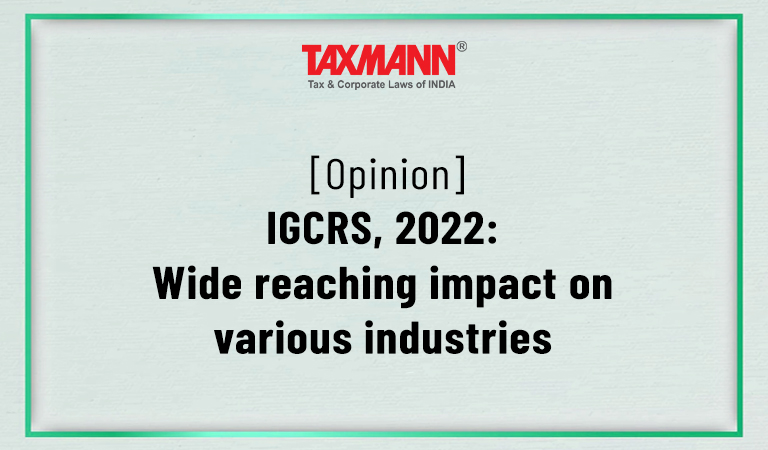[Opinion] IGCRS, 2022: Wide reaching impact on various industries
- Blog|News|GST & Customs|
- 2 Min Read
- By Taxmann
- |
- Last Updated on 31 October, 2022

Brijesh Kothary & Chitrartha Gupta – [2022] 143 taxmann.com 372 (Article)
Recently, the Central Government has notified the revamped Customs (Import of Goods at Concessional Rate of Duty or for Specified End Use) Rules, 2022, (for brevity, ‘IGCRS’) which supersedes IGCR 2017, prescribing a series of compliance requirements at different levels when compared with erstwhile Rules. These changes are including but not restricted to one-time prior intimation, furnishing of surety/security/undertaking, maintenance of record and Form IGCR-3, Job work & Unit Transfer, time limit for utilization, re-export or domestic clearance etc. This article, however, focuses more on the aspect of applicability of IGCRS.
One striking change brought in by IGCRS which requires immediate attention is the widened scope in terms of its applicability. The ICGRS is now not only applicable to those Customs notification which mandated its compliance, but also covers, any Notification issued under Section 11 or Section 25(1) of the Customs Act, 1962, wherein the duty benefit is dependent upon the use of the goods imported for the manufacture of any commodity or provision of output service or being put to a specified end use.
Rule 3(m) of ICGRS, defines “specified end use” as dealing with the goods imported in a manner specified in the notification and includes supply to the intended person and the term “end use recipient” shall be construed accordingly. Thus, any Notification issued under either Section 11 or Section 25(1) of the Customs Act, 1962, which prescribes a specific end use or a manner in which such goods are to be dealt with, appear to be falling under the ambit of IGCRS.
Recently, the Hon’ble Madras High Court in Nordex India (P.) Ltd. v. Commissioner of Customs [Writ Petition No. 8026 of 2019, dated 17-8-2022], while dealing with the benefit of Sl. No. 362(3) [read with Condition 45] of Notification No.12/2012-Cus, dated 17.03.2012, which is for wind operated electricity generator (WOEG) related imports, observed that the phrase “he shall use them for the specified purpose” entails a mandatory usage of imported goods by the importer for a certain specific end use as mentioned.
Click Here To Read The Full Article
Disclaimer: The content/information published on the website is only for general information of the user and shall not be construed as legal advice. While the Taxmann has exercised reasonable efforts to ensure the veracity of information/content published, Taxmann shall be under no liability in any manner whatsoever for incorrect information, if any.

Taxmann Publications has a dedicated in-house Research & Editorial Team. This team consists of a team of Chartered Accountants, Company Secretaries, and Lawyers. This team works under the guidance and supervision of editor-in-chief Mr Rakesh Bhargava.
The Research and Editorial Team is responsible for developing reliable and accurate content for the readers. The team follows the six-sigma approach to achieve the benchmark of zero error in its publications and research platforms. The team ensures that the following publication guidelines are thoroughly followed while developing the content:
- The statutory material is obtained only from the authorized and reliable sources
- All the latest developments in the judicial and legislative fields are covered
- Prepare the analytical write-ups on current, controversial, and important issues to help the readers to understand the concept and its implications
- Every content published by Taxmann is complete, accurate and lucid
- All evidence-based statements are supported with proper reference to Section, Circular No., Notification No. or citations
- The golden rules of grammar, style and consistency are thoroughly followed
- Font and size that’s easy to read and remain consistent across all imprint and digital publications are applied



 CA | CS | CMA
CA | CS | CMA
